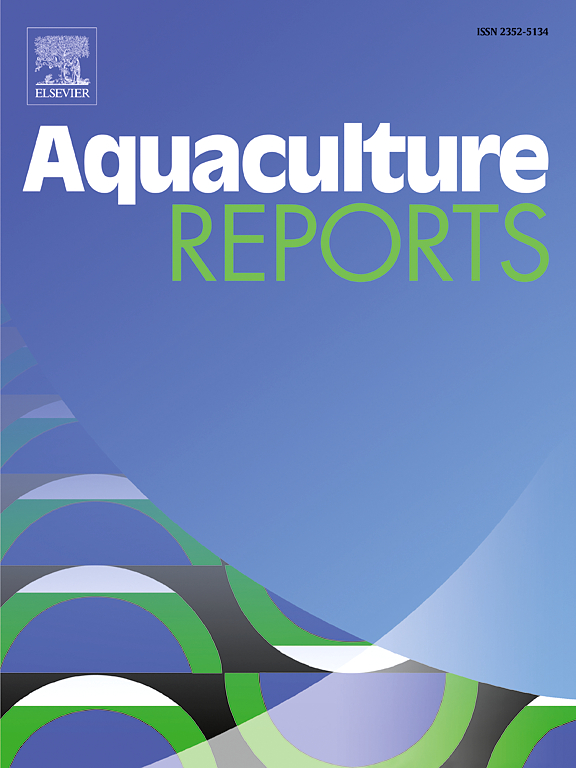Molecular cloning and expression dynamics of Atrogin-1 in muscle tissue of Russian sturgeon (Acipenser gueldenstaedtii) under high salt stress
IF 3.7
2区 农林科学
Q1 FISHERIES
引用次数: 0
Abstract
Atrogin-1, a muscle-specific ubiquitin ligase, is integral to the regulation of protein degradation and plays a pivotal role in the targeted degradation of critical muscle signaling proteins, which can lead to skeletal muscle dysfunction. High salt stress is known to induce muscle atrophy and alter the physical and chemical properties of muscle in cultured fish. Conversely, an optimal salinity level can enhance muscle quality. The Russian sturgeon (Acipenser gueldenstaedtii), an anadromous species of significant economic value, is potentially adaptable to brackish water environments, yet the underlying regulatory mechanisms remain elusive. To elucidate the regulatory mechanism of Atrogin-1 in response to high salt stress in Russian sturgeon, we conducted cDNA cloning and expression analysis. The cDNA encoding the Russian sturgeon protein Atrogin-1 was successfully cloned, comprising 1472 bp and encoding 353 amino acid residues (with an open reading frame of 1062 bp). Utilizing the sequence of Russian sturgeon atrogin-1, we designed novel primers and a specific anti-peptide antibody for our study, confirming that atrogin-1 is selectively expressed in skeletal muscle and heart tissues. The sturgeons were then allocated into four experimental groups for salt stress exposure; one control group was maintained in freshwater, while the others were subjected to salinities of 8 ‰, 16 ‰, and 24 ‰, respectively. Quantitative PCR (qPCR) and western blot analysis were employed to assess Atrogin-1 expression levels under high salt stress. A significant upregulation of atrogin-1 mRNA was observed at salinities of 16 ‰ and 24 ‰ compared to the control group. Similarly, protein expression levels of Atrogin-1 were markedly elevated under the same salinity conditions. Our findings indicate that the modulation of Atrogin-1 expression is a sensitive indicator of the response to high salt stress. This research is anticipated to inform aquaculture practices and shed light on the selection of germplasm resources for the development of salt-tolerant Russian sturgeon strains.
高盐胁迫下俄罗斯鲟鱼肌肉组织中Atrogin-1的分子克隆及表达动态
Atrogin-1是一种肌肉特异性泛素连接酶,是调节蛋白质降解不可或缺的一部分,在关键肌肉信号蛋白的靶向降解中起关键作用,这可能导致骨骼肌功能障碍。高盐胁迫可引起养殖鱼类肌肉萎缩,改变肌肉的物理和化学特性。相反,最佳盐度水平可以增强肌肉质量。俄罗斯鲟鱼(学名:Acipenser gueldenstaedtii)是一种具有重要经济价值的洄游物种,具有适应咸淡水环境的潜力,但其潜在的调节机制尚不明确。为了阐明Atrogin-1在俄罗斯鲟鱼高盐胁迫中的调控机制,我们进行了cDNA克隆和表达分析。成功克隆了俄罗斯鲟鱼蛋白Atrogin-1的cDNA,全长1472 bp,编码353个氨基酸残基(开放阅读框1062 bp)。利用俄罗斯鲟鱼atrogin-1的序列,我们设计了新的引物和特异性抗肽抗体,证实了atrogin-1在骨骼肌和心脏组织中有选择性表达。然后,这些鲟鱼被分成四个实验组,分别接受盐胁迫;其中一个对照组维持在淡水中,而其他组分别受到8 ‰,16 ‰和24 ‰的盐度。采用定量PCR (qPCR)和western blot检测高盐胁迫下Atrogin-1的表达水平。与对照组相比,在16 ‰和24 ‰的盐度下,atrogin-1 mRNA显著上调。同样,在相同的盐度条件下,Atrogin-1的蛋白表达水平也显著升高。我们的研究结果表明,Atrogin-1表达的调节是对高盐胁迫反应的敏感指标。这项研究预计将为水产养殖实践提供信息,并为开发耐盐俄罗斯鲟鱼品系的种质资源选择提供启示。
本文章由计算机程序翻译,如有差异,请以英文原文为准。
求助全文
约1分钟内获得全文
求助全文
来源期刊

Aquaculture Reports
Agricultural and Biological Sciences-Animal Science and Zoology
CiteScore
5.90
自引率
8.10%
发文量
469
审稿时长
77 days
期刊介绍:
Aquaculture Reports will publish original research papers and reviews documenting outstanding science with a regional context and focus, answering the need for high quality information on novel species, systems and regions in emerging areas of aquaculture research and development, such as integrated multi-trophic aquaculture, urban aquaculture, ornamental, unfed aquaculture, offshore aquaculture and others. Papers having industry research as priority and encompassing product development research or current industry practice are encouraged.
 求助内容:
求助内容: 应助结果提醒方式:
应助结果提醒方式:


